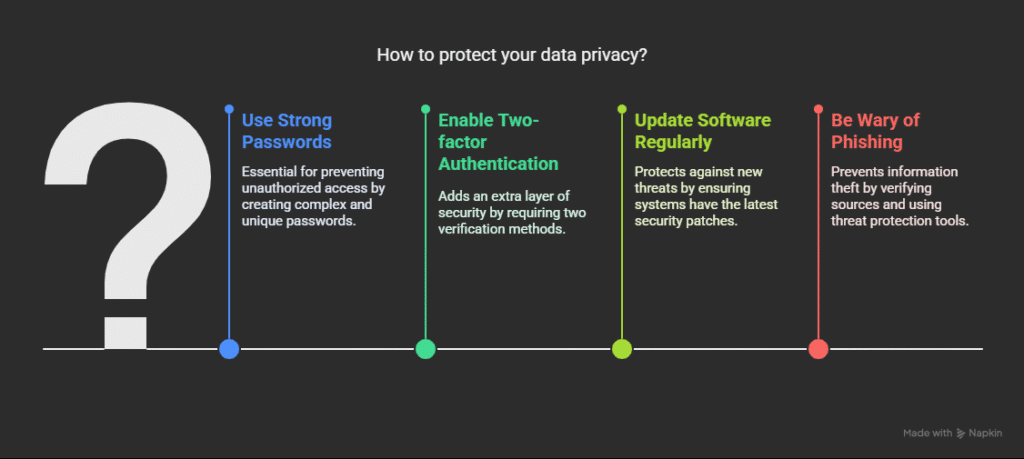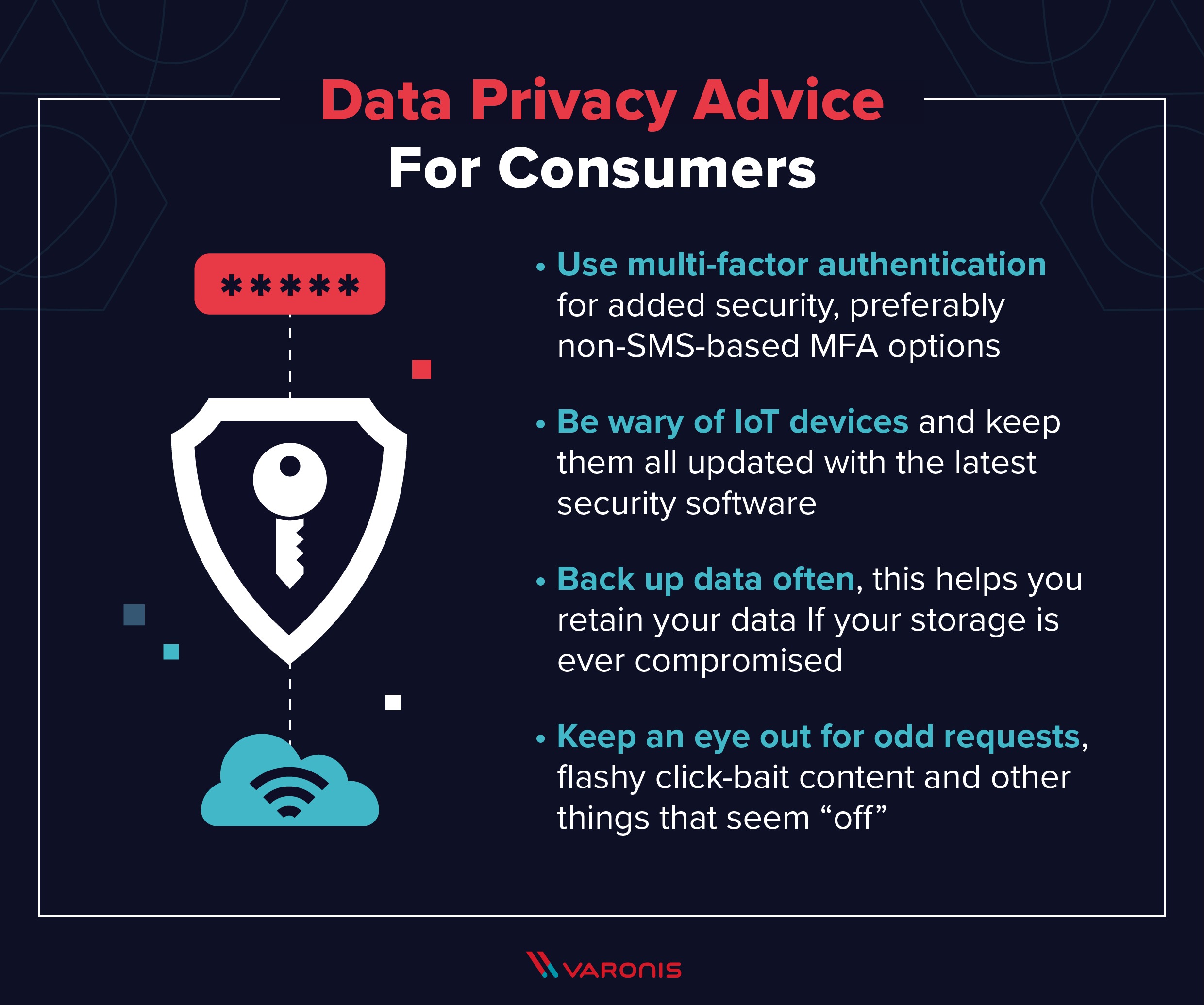Protecting your data privacy is crucial in today’s digital age. With increasing cyber threats and data breaches, safeguarding personal information has never been more important.
Every click, share, and download can expose you to potential risks in our interconnected world. Cybercriminals are constantly on the lookout for vulnerabilities to exploit. Understanding how to protect your data privacy is essential for maintaining your security and peace of mind. Taking proactive actions can make a significant difference from simple steps like using strong passwords to more advanced measures like utilizing a VPN. This guide will provide practical tips to enhance online privacy and keep data safe. For a reliable VPN service, check out NordVPN, known for its top-notch security features and ease of use.
Introduction To Data Privacy
In today’s digital age, data privacy has become a critical concern. With the rise of cyber threats and data breaches, understanding how to protect your personal information is vital. This section will introduce the concept of data privacy and explain why it is essential to safeguard your data.
Understanding The Importance Of Data Privacy
Data privacy refers to the protection of personal information from unauthorized access. This includes details like your name, address, email, and financial information. Ensuring data privacy helps maintain your security and prevents identity theft. It also protects your privacy from being compromised by malicious actors.
In addition, many companies collect data for various purposes. This information can be misused or sold to third parties without proper data privacy measures. Thus, protecting your data ensures that your personal information is used ethically and responsibly.
Common Threats To Data Privacy
Several threats can compromise your data privacy. Awareness of these risks can help you proactively protect your information.
Phishing Scams: Fraudulent emails or messages designed to steal sensitive information.
Malware: Malicious software that can infect your devices and steal data.
Data Breaches: Unauthorized access to databases exposing large amounts of personal information.
Social Engineering: Manipulative tactics used to trick individuals into revealing confidential information.
By understanding these common threats, you can better protect your data privacy and stay safe online.
Key Strategies For Protecting Your Data
In today’s digital age, protecting your data privacy is crucial. With increasing cyber threats, adopting effective strategies to safeguard your information is important. Here are some key strategies to help you protect your data:
Use Strong, Unique Passwords
Creating strong, unique passwords is essential for data protection. Use a combination of letters, numbers, and special characters. Avoid common words or easily guessable information. Consider using a password manager like WordPress, which securely generates and stores complex passwords.
Enable Two-factor Authentication
Two-factor authentication (2FA) adds an extra layer of security. It requires you to verify your identity using two different methods. This could be a combination of a password and a code sent to your phone. Many services, including email providers and social media platforms, offer 2FA. Ensure it’s enabled on all your important accounts.
Regularly Update Software And Devices
Keeping your software and devices up to date is crucial. Updates often include security patches that protect against new threats. Set your system to update automatically. Regularly check for updates on all your devices, including smartphones, tablets, and computers.
Be Wary Of Phishing Scams
Phishing scams are attempts to steal your personal information. They often come in the form of emails or messages that look legitimate. Always verify the source before clicking on links or providing sensitive information. Use tools like NordVPN’s Threat Protection to block malicious websites and prevent phishing attacks.
For enhanced security, consider using a VPN service like NordVPN. It encrypts your internet connection, ensuring your online activities remain private and secure.

Tools And Technologies For Data Privacy
Protecting your data privacy is crucial in today’s digital world. Various tools and technologies can help safeguard your personal information. Choosing the right solutions can make a significant difference. Below are some essential tools and technologies to enhance your data privacy.
Choosing The Right Vpn
A Virtual Private Network (VPN) is one of the best tools for ensuring online privacy. NordVPN is a popular choice for many. It encrypts your internet connection and hides your IP address and location. This ensures that your online activities remain private.
NordVPN offers:
Uninterrupted Streaming: No limits on bandwidth or speed.
Easy VPN Setup: Simple setup with just a few clicks.
Next-Generation Encryption: Uses AES-256 encryption.
Malware Protection: Blocks trackers and hides ads.
Strict No-Log Policy: Does not collect or store private information.
One Account, Ten Devices: Secure up to ten devices with one account.
With NordVPN, you can access geo-blocked content and enjoy high-speed connections. It’s an excellent tool for privacy-conscious users, streamers, and travelers. For more details, visit the official NordVPN website.
Secure Cloud Storage Solutions
Storing data in the cloud is convenient but comes with privacy risks. Choosing secure cloud storage solutions can protect your information from unauthorized access. Look for services that offer strong encryption and strict privacy policies.
Key features to consider:
End-to-End Encryption: Ensures data is encrypted before it leaves your device.
Zero-Knowledge Policy: Only you can access your data; the service provider cannot.
Multi-Factor Authentication: Adds an extra layer of security to your account.
Automatic Backups: Regular backups ensure data is not lost.
Some popular, secure cloud storage services include pCloud, Sync.com, and Tresorit. These services offer robust security features and are trusted by privacy-conscious users worldwide.
Encryption Tools For Data Protection
Encryption tools are essential for protecting sensitive data. They convert your information into a code to prevent unauthorized access. Using encryption tools can help secure your files, emails, and communications.
Popular encryption tools:
VeraCrypt: Free and open-source disk encryption software.
BitLocker: Integrated with Windows to provide full disk encryption.
NordLocker: From the makers of NordVPN, encrypts files and folders.
GnuPG: Encrypts emails and files using OpenPGP standards.
Encryption tools are vital for anyone handling sensitive data. They provide an extra layer of security, ensuring that only authorized users can access the information.

Credit: www.morganstanley.com
Protecting Data On Social Media
Social media platforms are a common target for data breaches. Protecting your data privacy on these platforms is crucial. This section will help you understand how to protect your data on social media.
Adjusting Privacy Settings
Most social media platforms provide various privacy settings. Adjusting these settings can help you control who can see your posts and personal information.
Check privacy settings: Regularly review and update your privacy settings.
Limit audience: Restrict your posts to friends or specific groups rather than the public.
Turn off location services: Disable location-sharing features to protect your location data.
Being Mindful Of What You Share
Think before you post. Once you share something online, it can be difficult to remove it completely.
Avoid sharing personal details: Do not share sensitive information such as your home address, phone number, or financial information.
Be cautious with photos and videos: Ensure that media files do not reveal personal information.
Manage app permissions: Review the permissions granted to apps connected to your social media accounts.
Protecting your data privacy on social media is essential. Simple steps like adjusting privacy settings and being mindful of what you share can make a big difference.
https://www.youtube.com/watch?v=sdpxddDzXfE
Best Practices For Businesses
In today’s digital world, protecting data privacy is crucial for businesses. Implementing best practices helps safeguard sensitive information and build trust with customers. Below are some key strategies companies can adopt to enhance data privacy measures.
Employee Training And Awareness
Employees play a vital role in data protection. Regular training ensures they understand the importance of data privacy and how to handle sensitive information securely. Training programs should cover:
Recognizing phishing attempts and suspicious emails.
Safe browsing practices and avoiding malicious websites.
Secure password creation and management.
Proper handling of sensitive customer data.
Interactive sessions, workshops, and real-life scenarios can make the training more engaging. Reinforce learning with regular updates and reminders to keep data privacy in mind.
Implementing Data Protection Policies
Clear and comprehensive data protection policies are essential. These policies should outline procedures for data collection, storage, and sharing. Key elements of a robust data protection policy include:
Policy Element | Description |
|---|---|
Data Encryption | Use advanced encryption (AES-256) to secure data. |
Access Controls | Limit access to sensitive data to authorized personnel only. |
Data Retention | Define how long data is kept and procedures for secure disposal. |
Incident Response | Establish a plan for responding to data breaches or security incidents. |
Regular audits and reviews ensure that policies stay relevant and effective. To maintain compliance, businesses should remain updated on legal requirements and industry standards.
Businesses can significantly enhance their data privacy measures by following these best practices. This protects sensitive information and fosters trust and loyalty among customers.
Legal Considerations And Compliance
Protecting your data privacy is crucial. Understanding the legal landscape helps you stay compliant and secure. This section covers important legal considerations and aspects of compliance.
Understanding Data Privacy Laws
Data privacy laws vary by country and region. They aim to protect personal information from misuse. Here are the key points to understand:
Personal Data: Any information related to an identifiable person.
Data Controller: The entity determining how and why personal data is processed.
Data Processor: The entity processing data on behalf of the controller.
Complying with these laws is essential for businesses. It helps avoid penalties and builds trust with customers.
Gdpr And Its Impact On Data Protection
The General Data Protection Regulation (GDPR) is significant in the EU. It impacts how businesses handle personal data. Key aspects of GDPR include:
Aspect | Description |
|---|---|
Data Subject Rights | Rights to access, rectify, erase, and restrict data processing. |
Consent | Requires clear, affirmative action for data processing consent. |
Data Breach Notification | Mandatory reporting of breaches within 72 hours. |
Data Protection Officers (DPO) | Appointment of DPOs for monitoring compliance. |
GDPR compliance is not optional for businesses operating in the EU. Non-compliance can result in hefty fines.
Staying informed about data privacy laws and regulations is crucial. It ensures your business remains compliant and protects customer data effectively.
Conclusion: Staying Vigilant About Data Privacy
Protecting your data privacy is a continuous process. It requires regular updates and proactive steps. With the growing threats, staying vigilant is key.
Continuous Monitoring And Improvement
Regularly monitor your data privacy settings. Ensure all software and apps are up-to-date—frequent updates close security gaps.
Review Permissions: Check app permissions on your devices. Limit access to sensitive data.
Update Software: Always install the latest security patches. This helps protect against new threats.
Use Strong Passwords: Change passwords regularly. Use a password manager like NordPass for added security.
Continuous monitoring helps identify potential risks early. Make it a habit to review your privacy settings regularly.
Final Thoughts On Protecting Your Data
Staying vigilant about data privacy is essential. With tools like NordVPN, you can enhance your security.
Feature | Benefit |
|---|---|
Next-Generation Encryption | Protects your data with AES-256 encryption. |
No-Logs Policy | Ensures your online activities remain private. |
Threat Protection | Blocks ads, trackers, and malware. |
Multi-Device Support | Secure up to ten devices with one account. |
NordVPN offers features like Double VPN and Onion Over VPN. These features provide extra layers of security.
In today’s digital age, data privacy is crucial. Protect your information with trusted tools and practices.

Credit: www.varonis.com

Credit: security.berkeley.edu
Frequently Asked Questions
How Can Data Privacy Be Protected?
Protect data privacy by using strong passwords, enabling two-factor authentication, encrypting sensitive information, regularly updating software, and educating users on security best practices.
How Can You Protect Your Privacy?
Use strong passwords and update them regularly. Enable two-factor authentication. Avoid sharing personal information online. Use a VPN for secure browsing. Regularly review privacy settings on social media.
How Can We Protect User Data Privacy?
Protect user data privacy by using encryption, strong passwords, regular updates, access controls, and employee training. Conduct regular security audits.
What Are 3 Ways In Which You Can Protect Your Data?
1. Use strong, unique passwords and change them regularly. 2. Enable two-factor authentication for additional security. 3. Regularly back up your data to a secure location.
Conclusion
Protecting your data privacy is essential in today’s digital world. Simple steps can make a big difference. Use strong passwords and enable two-factor authentication. Regularly update your software and avoid suspicious links. Consider using a VPN for added security. For top-notch protection, check out NordVPN. It offers advanced encryption and a strict no-logs policy. Stay safe and keep your information secure.
